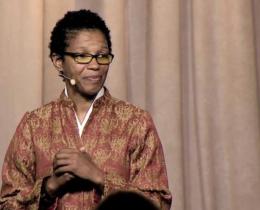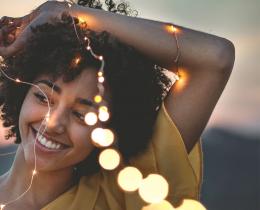Omega: What motivated you to join the military?
Corwin: I grew up with mostly male cousins and two brothers, so from a young age I think I was trying to keep up with the pack. Because of this, I had a desire, even as a child, to challenge some of the expectations of what it meant to be a girl or a woman. My older brother was involved in the Army and I learned about ROTC (Reserve Officers' Training Corps) and figured, “Well this is my ticket.” I was fortunate to get accepted into the Navy ROTC program at Vanderbilt University. I didn't really know where it would take me. I just knew that it sounded exciting and challenging, and it was an unconventional adventure, which suited me just fine.
Omega: What did you do in the Navy?
Corwin: In your sophomore year you have to put together a dream sheet of your preferences. I started thinking about going into aviation, mostly because it sounded thrilling, and, looking back, I think I wanted to stir the pot and do something that would surprise everyone. I put in for aviation and was very fortunate to get selected for it. As soon as I graduated from college, I was officially an officer in the military and began flight school. My brother had been a helicopter pilot in the Army, and at first I assumed I’d follow in his footsteps, but halfway through flight school, I just knew I would always regret it if I didn’t at least try for Navy jets. I put in the request and was again lucky enough to be selected.
Omega: What was it like to be a woman in a field so dominated by men?
Corwin: I can’t say that I was the first to chart the course in this field—there were a lot of amazing women who came before me and helped push the envelope of expectations. On an aircraft carrier there are probably 20-30 percent women. The F-18 community tends to have a smaller percentage, more like 5 percent, but there were other women around. Let’s just say it was definitely a different world. You had to be in with the guys and fight for your right to be there. Acceptance was key to making it bearable. I also had to navigate how to keep my femininity while trying to progress. I often learned the hard way. I never had an easy go of it, but I don’t think any of us did.
It’s a rollercoaster being in the military, and in my 20s I just wanted to steamroll it. I wanted to earn the respect from the guys as a professional pilot, but I wanted it to be on my terms. I was given the call sign Rodeo Clown because I wore makeup, even in the jet. To me it wasn’t that big of a deal. I mean, how many women go to work every day with some mascara on? At first I didn’t realize how uncomfortable this would make some people.
Once I realized this, well then there was no way I was going to change just to make them comfortable. I suppose this was one of those defining moments for me as I began to declare my femininity and understand that I didn’t want to just be a tomboy doing this, but a feminine woman doing this job. Looking back I realize I had a defiant way of making my stand, but I thought there was something innately wrong in the fact that women had to fit into some predetermined box for the men around them to be comfortable. I wanted them to be open to the fact that I could fly the jet, be one of the guys, and still be a woman in heels come Friday night.
Omega: What was your relationship like with the other women pilots?
Corwin: In a male dominated field, you have to learn to fit in with the guys; there’s just no other way to survive. I recognized fairly quickly what a detriment that could be to the sisterhood of women in that world. I've only recently begun to explore how distancing myself from the other women in order to be accepted as “one of the boys” affected my female relationships. It’s a shame to me now, when I look back, that we as military women didn’t stick together more often and that I didn’t manage to find that balance. Recently, I have been a part of cocreating a women’s military mentoring group to hopefully influence this dynamic. It’s long overdue.
Omega: When did you first encounter yoga?
Corwin: I had been a gymnast all my life, up until I went to college. In my junior year of college I tried yoga for the first time, but I was that yogi that would show up late and leave before savasana [relaxation] because I just could not chill out. After I graduated college and joined the Navy, my yoga practice quickly became my sanctuary. It was the one time where every move I made wasn't critiqued or analyzed. I think that's when I started to recognize the importance of having a safe place to retreat without any pressure to “be” anything for anyone else, especially myself. It is also when I started to discover more of the transformational and therapeutic sides of yoga.
Omega: How did you transition from being a yoga student to being a yoga teacher in the military?
Corwin: At first I was not comfortable telling the guys I was practicing yoga. I’d just say I was going to the gym and then stealthily sneak off to yoga class. I think it was during my second deployment overseas that my squadron mates had figured out where I was sneaking off to. A few of them had questions and had heard how challenging yoga was, so they asked if I could teach them a few sequences. So it started out with me just sharing my practice with a few of them. I was quite surprised at how many people were interested in yoga when they have a safe trustworthy place to ask questions about it.
At this point I was experiencing so many of the healing aspects of yoga that I simply had to know more. I couldn’t deny how powerful a force it was becoming in my life. I was stationed in Virginia Beach and stumbled into a studio where the teacher had worked a lot with military groups. Eventually I began coteaching with her and attending some of her private classes with Special Forces. Initially I didn’t have a desire to teach, but I realized I’d found something that had been a lifeline for me, so how could I not share this?
Up until then it had been my personal practice and I didn’t see the worlds mixing. But when I realized the position I was in to help introduce it—to become a conduit for the two worlds—I realized this path had chosen me. I was part of these two worlds, both of which had a claim on me, and I was meant to be in both. Then opportunities that I couldn’t have imagined started appearing.



